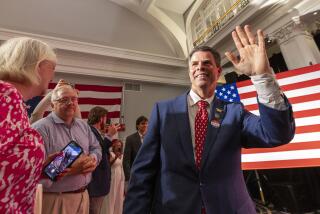Rendell Wins Democratic Nomination for Pa. Governor
- Share via
PHILADELPHIA — Running on his record as Philadelphia mayor, pro-business liberal Ed Rendell soundly defeated conservative Robert Casey Jr. to win the Democratic nomination for Pennsylvania governor Tuesday.
In another closely watched primary that cost Pennsylvania one of its Democratic congressmen, veteran Rep. John Murtha ousted Rep. Frank Mascara in a district redrawn by Republicans.
With 97% of precincts reporting, Rendell had 662,167 votes, or 56%, and Casey had 526,873 votes, or 44%. Rendell advanced to the November general election against Atty. Gen. Mike Fisher, who was unopposed in the GOP primary.
“Last February, when I started out on this campaign, nobody thought I had a chance to win because I was the Philadelphia candidate,” Rendell, a former chairman of the Democratic National Committee, told scores of cheering fans.
“The experts said no Philadelphian could ever be elected governor of this state. But the experts, as they often do, underrated the people of Pennsylvania,” he said.
At his concession speech, Casey said it had been a tough campaign and predicted Rendell would win this fall.
Pennsylvania was one of three states that held primaries Tuesday. The others were Arkansas and Oregon, where Democrats nominated a former attorney general to succeed Democratic Gov. John Kitzhaber. Three Republicans sought their party’s nomination.
The governor’s primary was the most expensive in Pennsylvania history, with more than $32 million raised by the two Democrats. The race was thrown open when GOP Gov. Mark Schweiker decided against seeking a full term after taking over when Tom Ridge became homeland security director.
The vote concluded a campaign that presented voters with a clear choice--Rendell and Casey offered stark contrasts in style, background, ideology and priorities.
Rendell, the gregarious former mayor of Philadelphia, ran as an economic centrist and a social liberal. He supports legalized abortion and gun control. Casey, the reserved son of former Pennsylvania Gov. Bob Casey, ran as a social conservative and economic liberal. Their differences were clear on several other policy fronts. In his campaign, Rendell emphasized education and creating jobs. Casey focused heavily on expanding prescription drug coverage for seniors and providing health care to uninsured workers.
The race proved unusually nasty from the outset. With Rendell emphasizing his extensive political experience, Casey spent heavily on ads attacking his opponent’s record as mayor of Philadelphia.
In the congressional primary, the GOP’s redistricting plan placed Mascara’s home in the new 18th District, where he was encouraged by fellow Democrats to campaign. But Mascara chose to run in the 12th District against Murtha, a 14-term veteran with a substantial fund-raising edge.
With 89% of precincts reporting, Murtha had 53,315 votes, or 65%, and Mascara had 28,771 votes, or 35%.
Elsewhere:
* In Arkansas, freshman Sen. Tim Hutchinson defeated conservative state Rep. Jim Bob Duggar in the GOP primary and will face Democratic Atty. Gen. Mark Pryor this fall. GOP Gov. Mike Huckabee easily defeated his challenger and will take on Democrat Jimmie Lou Fisher, who faced a little-known opponent. Huckabee’s wife, Janet, was unopposed in her bid to be nominated secretary of state, setting up the historic prospect of a governor and spouse both running for statewide elected office.
* In Oregon, Ted Kulongoski, a former attorney general and state Supreme Court justice, won the Democratic gubernatorial nomination over Bev Stein and Jim Hill. Kevin Mannix, Ron Saxton and Jack Roberts battled for the GOP nomination.
More to Read
Get the L.A. Times Politics newsletter
Deeply reported insights into legislation, politics and policy from Sacramento, Washington and beyond. In your inbox twice per week.
You may occasionally receive promotional content from the Los Angeles Times.










